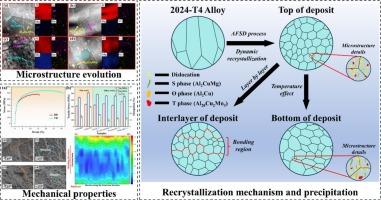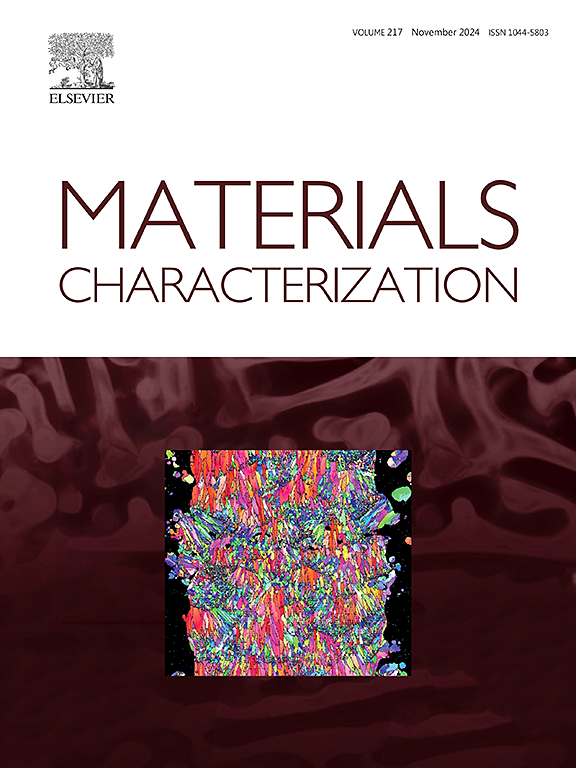Additive friction stir deposition of an Al-Cu-Mg alloy: Microstructure evolution and mechanical properties
IF 4.8
2区 材料科学
Q1 MATERIALS SCIENCE, CHARACTERIZATION & TESTING
引用次数: 0
Abstract
Additive Friction Stir Deposition (AFSD), an emerging solid-based additive manufacturing technology, has demonstrated significant potential in the fabrication of high-strength aluminum alloys. In this study, a 22 mm thick 2024 aluminum alloy deposit having ten layers was for the first time successfully fabricated using the AFSD technique. The correlation between the microstructure evolution and mechanical properties within the deposit was revealed. The results indicated that the deposit exhibited very fine recrystallized microstructure and excellent mechanical properties. Dynamic recrystallization occurred with the average grain sizes at the top, center, and bottom of the deposit being 3.0 μm, 4.7 μm, and 4.8 μm, respectively. The Al2CuMg (S phase) at grain boundaries of the deposit was observed to fracture due to the plastic deformation of the feedstock during the deposition process. The Vickers hardness of the deposit cross-section along the build direction (BD) changed from 125 HV of the top to 85 HV of the bottom. Better tensile properties in the TD compared to the BD were observed with the excellent tensile strength of 532 MPa and 473 MPa, and the elongation of 31.2 % and 15.2 %, respectively. The synergistically improvement of the tensile strength and elongation in the TD was attributed to the uniform microstructure and mechanical properties exhibited by each deposit layer.

铝-铜-镁合金的添加剂搅拌摩擦沉积:微观结构演变和机械性能
增材摩擦搅拌沉积(AFSD)是一种新兴的固基增材制造技术,在制造高强度铝合金方面具有巨大潜力。在本研究中,首次使用 AFSD 技术成功制造出厚度为 22 毫米、共十层的 2024 铝合金沉积物。研究揭示了沉积物内部微观结构演变与机械性能之间的相关性。结果表明,沉积物表现出非常精细的再结晶微观结构和优异的机械性能。发生动态再结晶时,沉积物顶部、中心和底部的平均晶粒大小分别为 3.0 μm、4.7 μm 和 4.8 μm。在沉积过程中,由于原料的塑性变形,观察到沉积物晶界处的 Al2CuMg(S 相)断裂。沉积物横截面沿构建方向(BD)的维氏硬度从顶部的 125 HV 变为底部的 85 HV。与 BD 相比,TD 的拉伸性能更好,拉伸强度分别为 532 兆帕和 473 兆帕,伸长率分别为 31.2 % 和 15.2 %。TD 拉伸强度和伸长率的协同改善归功于每个沉积层都具有均匀的微观结构和机械性能。
本文章由计算机程序翻译,如有差异,请以英文原文为准。
求助全文
约1分钟内获得全文
求助全文
来源期刊

Materials Characterization
工程技术-材料科学:表征与测试
CiteScore
7.60
自引率
8.50%
发文量
746
审稿时长
36 days
期刊介绍:
Materials Characterization features original articles and state-of-the-art reviews on theoretical and practical aspects of the structure and behaviour of materials.
The Journal focuses on all characterization techniques, including all forms of microscopy (light, electron, acoustic, etc.,) and analysis (especially microanalysis and surface analytical techniques). Developments in both this wide range of techniques and their application to the quantification of the microstructure of materials are essential facets of the Journal.
The Journal provides the Materials Scientist/Engineer with up-to-date information on many types of materials with an underlying theme of explaining the behavior of materials using novel approaches. Materials covered by the journal include:
Metals & Alloys
Ceramics
Nanomaterials
Biomedical materials
Optical materials
Composites
Natural Materials.
 求助内容:
求助内容: 应助结果提醒方式:
应助结果提醒方式:


